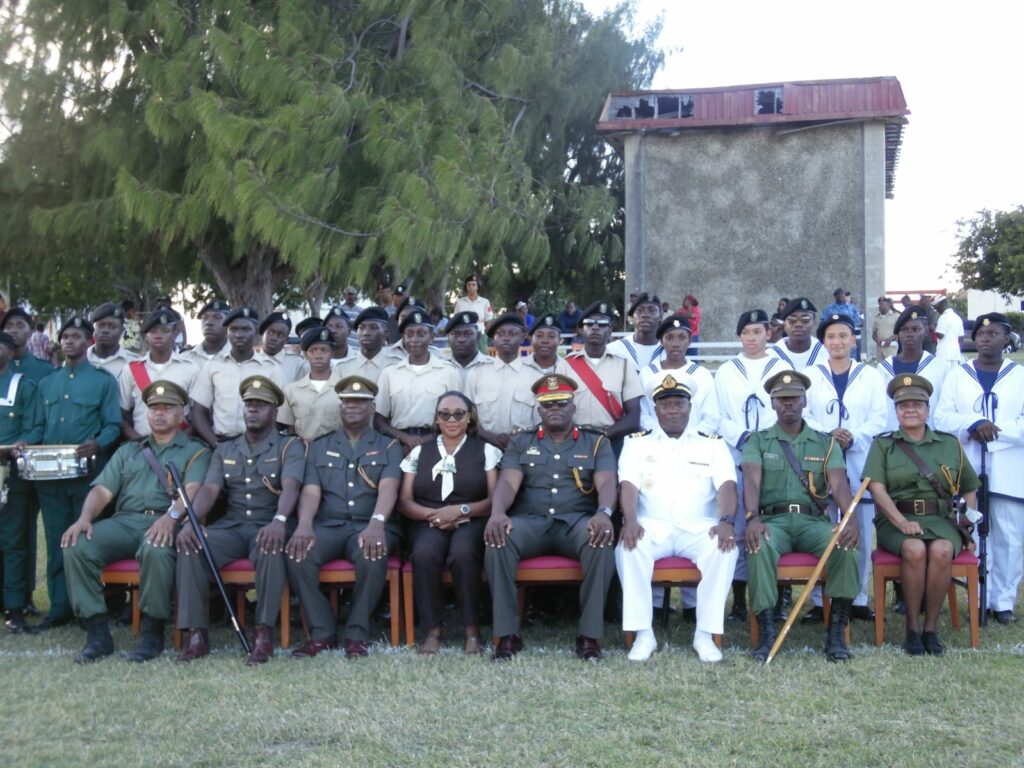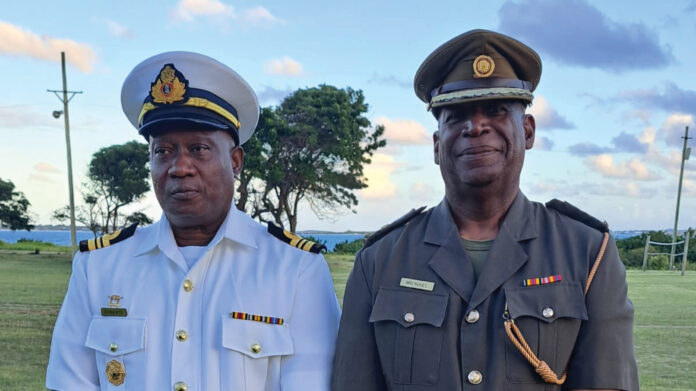“I believe in firm discipline, because without such discipline, no progress is made and no leadership becomes effective.” Heartfelt words from Major Samuel C Roberts, the new Commandant of the Antigua and Barbuda National Cadet Corps (ABNCC). Major Roberts took the reins from Major Alando Michael during a change of command ceremony at Camp Blizzard on January 27.
Major Roberts expressed much gratitude to the Chief of Defence Staff Colonel Telbert Benjamin for his foresight and belief that he can “make a meaningful contribution to further the development of the Antigua and Barbuda National Cadet Corps”. The Commandant vowed to uphold the standards set by his predecessors and work closely with all stakeholders. Major Roberts’ ties with the Antigua and Barbuda Defence Force (ABDF) dates back to 1982 when he enlisted as a soldier. As a devoted father and husband, he understands the critical role young people and families play in national development, and remains committed to bolstering youth development and empowerment.
Now, for those of you who are wondering what is so special about the ABNCC, let’s look at its history, the scope of programmes and their implications for personal and professional development, as well as the need to invest in our youth. The Corps is a youth voluntary organisation that is sponsored by the government and military. Under the motto “Excellence through Discipline,” it continues to equip young people with vital skills such as discipline, punctuality, and physical and mental endurance.
Initially, the ABNCC catered for male secondary school students when it was established 1966 as a unit in Antigua Grammar School. However, the first intake of females, who came from Antigua Girls’ High School occurred in 1973. More progress was evident in 2003. With the assistance of the Barbados Sea Cadet Unit, the ABNCC Sea Cadet Unit was established to broaden the career options of senior cadets who were interested in seamanship. The ABDF Coast Guard conducts training for the sea cadets.

According to former commandant Major Michael, the ABNCC “is much more than just foot drills. There is a wide range of activities designed to capture the hearts and minds of today’s youth”. Fencing, archery, karate, swimming, and sailing are just a few. Cadets also participate in the Duke of Edinburgh programme, and cadetting now qualifies for the Caribbean Vocational Qualification (CVQ) awards. Major Michael also pointed out that there is developmental training in the areas of aviation, maritime and agriculture. A drum corps and steel band have already been established and the ABNCC are in the process of setting up a marching band.
Referring to Sections of the Defence Act, 2006, Major Michael noted: “To the best of my knowledge the ABNCC is the only youth organisation that by law marries discipline with our education system.” Under Section 223, it states that the disciplinary code should “be followed in respect of cadets, which must be prepared in collaboration with the Ministry of Education and the headteachers of the schools”. Major Michael emphasised that the Cadet Corps “can be a most worthwhile tool in the Ministry’s fight to reform delinquent youth.”
However, Lieutenant Claudette Samuel-Henry told YouthZone the success of that fight is highly dependent on more volunteers at the forefront and all angles of the reform movement, as well as increased corporate social responsibility. If our young people are going to reach that level of self-actualisation, the lieutenant insisted that there must be greater collaboration and synergies. As a corporate sponsor, officials thanked State Insurance Corporation for their continued support.
In his charge to the new commandant during Friday’s ceremony, Colonel Benjamin capitalised on the opportunity and appealed to the public for assistance. Highlighting that there are over 200 cadets in dire need of uniforms and equipment, Colonel Benjamin stated bluntly: “We need money.” The Chief of Defence Staff told Major Roberts and his team that they will have to start pursuing sponsorship aggressively to meet the needs of the ABNCC, especially since several schools already requested intervention.
Colonel Benjamin indicated that the ABNCC is “transitioning from a purely army-centric entity to one which focuses on our nation’s youth. We are pursuing programmes and activities with our nation’s youth in mind with a view to contributing in a tangible way to addressing youth violence and delinquency”. The chief thanked Major Michael, who holds multiple portfolios, for his two years of visionary leadership. He also expressed gratitude to the parents for entrusting their children with the ABNCC. The Department of Youth Affairs also extended its sincerest appreciation for Major Michael’s years of unwavering service that have transformed the lives of many youth.
Faced with mixed emotions, Major Michael told the gathering: “I am saddened that due to other duties, the tenure of my direct involvement in the mentoring and nurturing of the young men and women who stand here today and whom I have considered to be my own children will transition. However, I am also somewhat elated knowing that the baton is being passed on to Major Samuel Roberts, someone in whom I have the confidence to take the Cadet Corps to a higher level.”

